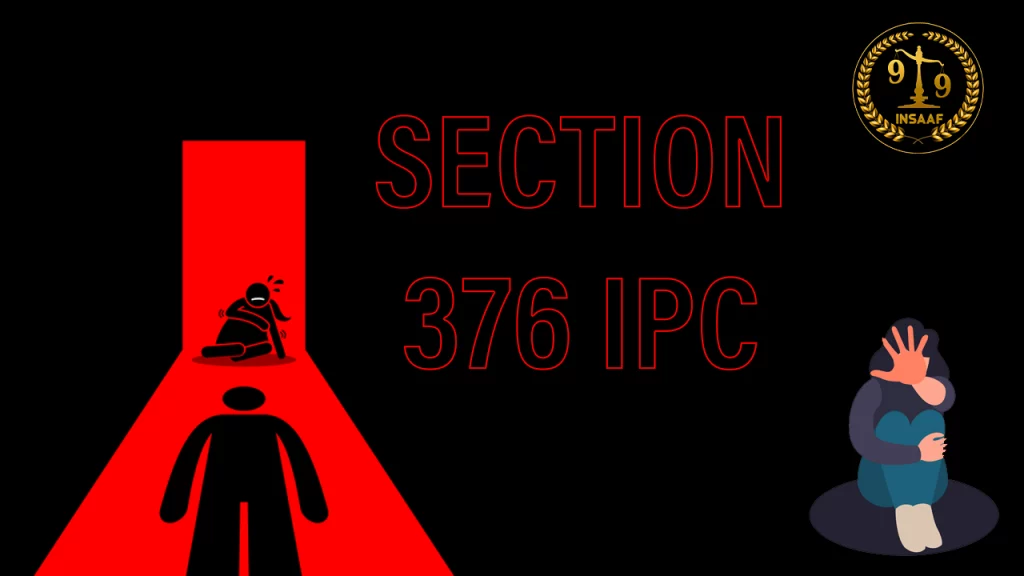

Online Legal Advice from Insaaf99® Online Lawyer Consultation in India


Online Legal Advice from Insaaf99® Online Lawyer Consultation in India

Sexual harassment is a traumatic ordeal that leaves victims emotionally scarred. It affects the victim in multiple ways and not only does it break down the person emotionally, but distress them psychologically, and affects them physically from such experiences. It often results in long-term trauma. Section 376 of the Indian Penal Code (IPC) criminalizes rape. It defines rape as the "sexual penetration of a woman against her will, by force, deception, or coercion."
The IPC's Section 376 covers a variety of sexual offenses, with a focus on rape. This provision plays an important role in preventing sexual exploitation and protecting victims and their rights. It is crucial for multiple reasons to comprehend its provisions. Section 376 permits the reporting of sexual misconduct, heightening awareness of its gravity and legal implications. It assists potential victims in comprehending their legal rights and options, encouraging them to pursue justice and preventing abuse.
Section 376 ensures impartial trials and appropriate sanctions for serious violations. This comprehension protects victims and defendants by preventing the misuse of the law and distinguishing between true and false allegations. Section 376 IPC is used by legal professionals to make equitable decisions and conduct trials. In addition to influencing social attitudes, policy shifts, and sexual violence activism, discussions regarding this provision have an impact on social attitudes.
The IPC section 376 specifies punishments for various degrees of sexual offenses. Rape is punishable by seven years to life in prison, while rape resulting in death or a vegetative state is punishable by 20 years to life in prison or the death penalty. Likewise, gang rape is punishable by harsh sentences. The sentencing process takes into account the nature of the offense, the victim's vulnerability, repeat offenses, and aggravating and mitigating factors. Cases of historical significance such as the Nirbhaya case demonstrate the necessity of proportional punishment for heinous offenses. These punishments serve as a deterrent, administer justice, and highlight society's position against sexual violence.
Section 376 IPC includes both bailable and non-bailable sexual offenses, depending on the gravity of the offense. However, bail is completely at the discretion of the honorable court. In non-bailable cases, strict criteria for bail approval are applied, taking into account the accused's criminal history, the severity of the offense, the evidence, and the potential risk of the defendant's ability to affect the witness or pieces of evidence.
In making these decisions, courts prioritize the public interest and the safety of the victim, especially in cases that have sparked public outrage. The responsibility of the court is to strike a delicate balance between protecting the rights of the accused and assuring justice for the victim. In non-bailable cases, granting bail depends on demonstrating that the accused will not impede the investigation or imperil the victim. This strategy highlights the legal system's commitment to fair proceedings and the protection of both victim and offender interests.
The bail provisions under Section 376 of the IPC are subject to change from time to time depending on the situation and circumstances of the case present in front of the court.
The major challenges in prosecuting sexual offenses include issues of delayed justice, social stigma, and the vulnerability of witnesses. The delay of every single day weakens evidence, while in Indian society there is still a stigma, victims are made to feel humiliated and discouraged from reporting. The evidence of victims and witnesses must be trusted, hence their safety must be guaranteed. A just legal procedure cannot be achieved without immediate reforms, awareness campaigns, and witness protection measures.

There are some landmark cases which affected the development of legal principles underlying the prosecution of sexual offenses, including Section 376 IPC:
It brought attention to the need to rethink rape laws and reframe what constitutes consent. The need for legal reform to shield victims and maintain fairness was underlined.
It established the principle that a victim's credibility does not decrease because of her history of sexual activity. The Court also held that the woman's consent was not relevant, as the accused had used force and coercion. It established the groundwork for protecting the reputation of crime victims.
A survivor's right to privacy and protection against the unwarranted revelation of personal facts during judicial procedures was established as a result of the case Sakshi v. Union of India (2004).
Understanding Section 376 IPC has shown the need for justice and victim rights. Landmark cases have shown how consent, victim privacy, and fairness have evolved in law. There is a need to promote victim-centeredness, fight stigma, social awareness and witness protection. Empathy and knowledge may create a safer society where justice triumphs and everyone's rights are protected, ensuring a future without sexual assaults.
Insaaf99, an online consultation firm, offers confidential legal support for sexual offense cases. Victims receive expert guidance on legal procedures, rights, and available resources, empowering them to make informed decisions. The platform assists the accused in understanding their legal rights and ensures a fair trial. Insaaf99's awareness campaigns challenge societal stigma and promote a supportive environment. By providing comprehensive assistance, Insaaf99 contributes to justice, victim protection, and a safer society.
Also Read